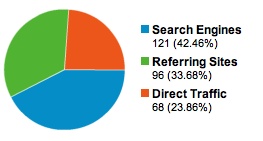 If you got to my blog via a Google, Yahoo, or (Microsoft) Live search, then you’re actually in the minority, but these days that’s how zillions of people find absolutely everything when they’re online. It’s what I call the I-forgot-the-name-of-that-site-but-I‘ll-just-bring-up-Google-and-search strategy. Over the past couple of years, specialized search engines that are focused solely on blogs have risen in prominence — and the one I pay most attention to is Technorati. Google also “knows about” blogs and your blog “places higher” in Google searches if it has lots of connections from other blogs. But, there are other such blog-search nexuses as well.
If you got to my blog via a Google, Yahoo, or (Microsoft) Live search, then you’re actually in the minority, but these days that’s how zillions of people find absolutely everything when they’re online. It’s what I call the I-forgot-the-name-of-that-site-but-I‘ll-just-bring-up-Google-and-search strategy. Over the past couple of years, specialized search engines that are focused solely on blogs have risen in prominence — and the one I pay most attention to is Technorati. Google also “knows about” blogs and your blog “places higher” in Google searches if it has lots of connections from other blogs. But, there are other such blog-search nexuses as well.
Here’s what I want to point out. The conventional wisdom from 1995 to maybe 2003, was that a web site had to keep its visitors “on the site” and never give them a chance to leave. A visitor who went off to another site was equivalent to a lost sale. So web sites jealously guarded their links and seldom contained “offsite” links (those whose targets are outside the web site). The sites that did contain “links pages” (meaning pages of reciprocal links with other web sites) were primarily those of individuals — and search engines like Yahoo.
Now today, in the blogosphere, it’s become an accepted belief that people who search for information about “X” would be interested in reading about “X” no matter whose blog it’s in. So if you’ve searched for “Dalai Lama” and gotten to my blog, the assumption is that you’d like to read other blogs that mention the “Dalai Lama.” How is that accomplished? And is it even good for me, as a blog-writer, to facilitate your going off to read other blogs?
I guess I’d say that in the blogosphere what we write is so interlinked with other blogs that honestly we don’t even care if you go read someone else’s blog, because you’re likely to come back here anyway. Or maybe I’d even encourage it because then you’d view me as your original source of information and you’d be back for more inspiration.
But if “old style” web sites found it hard to get people to “return,” then why is a blog stickier than a regular web site?
I think it’s stickier because of two factors. First, most blog readers either know the blogger personally, or are so in tune with the blogger that they’ll return over and over anyway; and second, RSS Feeds make it possible for visitors to subscribe to a blog and then return whenever there’s new material. (Thanks to Dave Winer and the other inventors, refiners and popularizers of this mechanism!)
And for me the feed is the real key factor. Always. If I can get you to subscribe to my RSS feed, then I don’t need to worry that you’ve gone elsewhere to continue reading, because you’ll be notified the next time I write a post and you’ll come back to read my blog again. Aha! That’s gotta be the key.
So here are the two connection-points I’d like you to be aware of. First, Technorati. And you’ll see a link to Technorati in the right sidebar on this blog on every page. Second, Sphere, which allows you to search out blog entries on other people’s blogs that are “like” my posts on my blog. There’s a link to Sphere at the bottom of each post. When you click it, Sphere examines the contents of my article and points you at similar articles on other blogs.
[…] The Median Sib; The Digital Movement; CEO Smack; Tours CMS; How to Spoter; Blogging the Dalai Lama; Sky’s Blog; Dean Lee; Roguely Stated; and […]